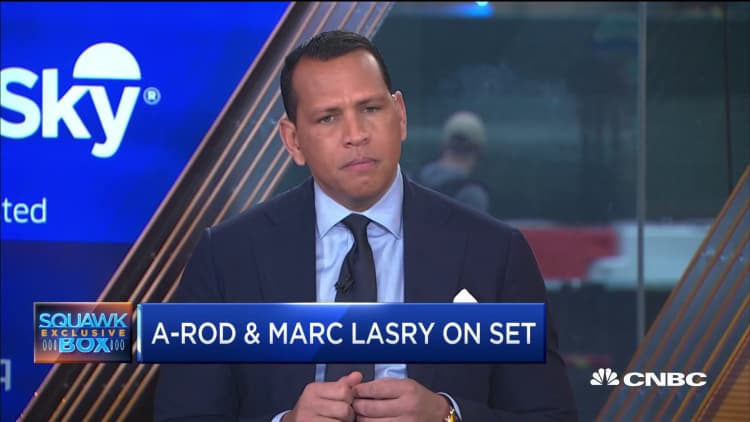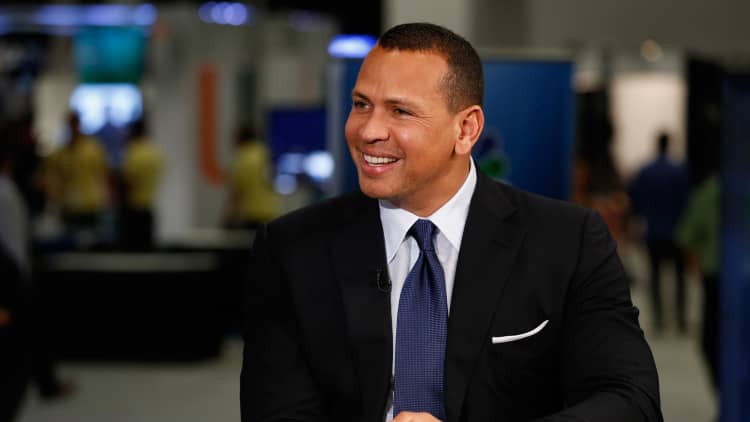
Former Major League Baseball star Alex Rodriguez is making it part of his mission to educate athletes about saving money.
While they may make big salaries during their time on the field, many of them wind up broke once they leave the game.
Instead of blowing all their money on big purchases such as fancy cars and big homes, they need to think about their future — and start putting money aside right away, suggests Rodriguez, better known as A-Rod.
"If you can actually save 10% of your money, almost as a mandatory, you can kind of dive into players and athletes going bankrupt," he said in an interview on CNBC's "Squawk Box" Friday.
Rodriguez, a World Series companion who played for the New York Yankees, Texas Rangers and Seattle Mariners, is one of the highest-paid athletes of all time. His beginnings, however, were more humble. He was raised by a single mother who worked two jobs in order to support the family.
He played his last Major League game in 2016 and now focuses on investing through his firm, A-Rod Corp., which he founded in 2003.
Those investments include Sonder, a home-rental company Rodriguez describes as "kind of a richer man's Airbnb," and Acorns, the micro-investing app that lets users invest their spare money. The app, which now has more than 5 million users, rounds up spending made on linked credit and debit cards and then invests it. (NBCUniversal and Comcast Ventures are also investors in Acorns.)
It's the latter he's hoping will help athletes take charge of their financial future. In fact, he's already spoken to several dozen team owners about joining him in his efforts.
"Not one has said, 'I don't like the idea,'" A-Rod said.
"We're making a bet that you'll make better decisions at 45 than 25," he added. "If players are going bankrupt at [a rate of] 60%, 70%, we can cut that in half and one day make it single digits."
More from Invest in You:
How more Americans can save for retirement
How much you'll need in retirement savings by age 30, 40, 50 and beyond
Make these money moves starting today (so you don't freak out in the fall)
One of those team owners is billionaire investor Marc Lasry, co-founder of Avenue Capital Group and co-owner of the NBA's Milwaukee Bucks. He agrees it's important to teach young athletes who have no background in finance what to do with their new windfall.
"Imagine if, when you were 18 or 19 years old, all of a sudden you're making millions of dollars," he told "Squawk Box" Friday.
"It takes a while to understand what to do," he added. "One thing we always tell everybody is, 'Look, just leave your money in the bank.
"You don't need to invest right now," Lasry said. "Just save that money because you've got a short career span.'"
Rodriguez certainly isn't alone in his quest to tackle the problem.
The concern around the financial wellness of athletes has been gaining steam in the decade since a 2009 Sports Illustrated article pointed out that 78% of former NFL players have gone bankrupt or experienced financial stress just after being retired for two years. Within five years of retirement, 60% of ex-NBA players are broke, the report stated. The causes can range from financial illiteracy to reckless spending to financial schemes.

Another former MLB star, Mark Teixeira, is also working to teach others to become financially secure.
"I've told every athlete that will listen, make sure you have enough in the bank when you retire that you never need another dollar — ever," he told CNBC in April. "I use 5% as a rule."
"So if you think you're gonna need 500 grand a year to live off of for the rest of your life, you better have 10 million bucks in the bank that's gonna create that income for you," said Teixeira, a member of CNBC's Financial Wellness Advisory Council.
When it comes down to it, it doesn't necessarily matter how they save — as long as they are doing it, A-Rod said.
You can even "take that 10% and you put it under your mattress," he said. That way, "families and [hangers on] cannot touch it."
CHECK OUT: How going 'cash only' helped this 23-year-old pay off $20,000 in debt in one year via Grow with Acorns+CNBC.
Disclosure: NBCUniversal and Comcast Ventures are investors in Acorns.






